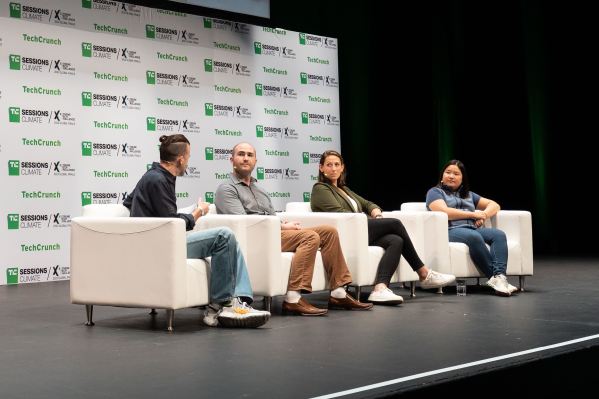For years, startups addressing the recycling crisis labored in relative anonymity. But for those who have stuck with it — or survived the lean times — investors are now rewarding them with growing support, three founders told me this week at TC Sessions: Climate 2022 in Berkeley.
“It’s been very hard to raise in the space, traditionally. I’ve seen that change very much in this past year,” said Miranda Wang, co-founder and CEO of Novoloop, a plastic upcycling startup.
There were several different catalysts behind that change, most of which can be traced to COVID.
“I don’t know if anybody remembers, but for a while there, it was kind of hard to get some toilet paper,” said Matanya Horowitz, founder and CEO of AMP Robotics, a robotic and AI vision startup that specializes in sorting recyclable materials.
“We saw that demand for toilet paper translating into demand for recycled content, translating into demand for our systems at a time where it was really hard to get people to come into work and people were afraid of touching packaging that may have come from households that had COVID. It was an accelerant for our business.”
COVID supply chain shortages combined with new business models have sparked a surge in investor interest, the panelists said.
Horowitz said that AMP Robotics’ AI-based vision system has become an unexpected source of revenue. “We’re not only selling technology, but we’re now beginning to operate a specialized type of recycling facility where we take low-quality material and we sort it ourselves and sell that, basically taking advantage of this commodity arbitrage.”
The battery industry is being similarly transformed by commodity prices; the cost of key minerals has risen dramatically in the past year as automakers ramped up electrification targets.
“In the past six months, how many companies have come out and said, ‘We’re going to be fully electrified by 20-whatever, right?’ And thinking about how much demand that’s creating, it’s really causing folks to think about recycling in a completely different way,” said Megan O’Connor, co-founder and CEO of Nth Cycle, a battery and mineral recycling startup.
The other side of that equation is the clever business model that Nth Cycle has devised. Most minerals recycling has been done by family businesses that have been around for decades. Each has their own way of processing metals, and they’re typically paid up front through tipping fees. “They get paid to take the liability off others’ books,” O’Connor said.
But now, with metal prices surging, scrap recyclers aren’t getting paid up front because the metals they usually collect and process have become a lot more valuable. To stay in the game, some have started to explore chemical recycling, which would give them a higher-value product to sell. But O’Connor said the process often requires multibillion-dollar facilities like the kinds found in mining operations.
“A lot of these family offices don’t have that kind of capital that they can access to build out these facilities,” she said.
Horowitz said the materials recovery facilities he works with often have similar constraints. That’s pushed AMP Robotics to not sell its robotic sorting machines but rent them out. “Our robots are offered on a lease where people basically pay the robot almost its own payroll. That naturally fits into the way they do business.”
O’Connor said that Nth Cycle has taken a similar approach to selling its electro-extraction units. “We offer it as a service model. All they have to do is pay us a fee per pound of battery that we process for them, and they get those materials back so they can choose what end market they want to sell back into. But it’s a much higher-grade product.”
Novoloop is also improving the value and utility of the plastics that go through its upcycling process. Typically, plastics that go through a recycling process are used to make something equivalent — think milk jugs being recycled into milk jugs. But Novoloop is taking polyethylene, which is commonly used in plastic films and bags, and breaking it down chemically to later create thermoplastic polyurethane (TPU), a widely used polymer that’s recently taken the sneaker world by storm.
Oftentimes, recycled plastics cost more than virgin materials, commanding what’s known as a “green premium” that companies will pay to fulfill sustainability goals or meet consumer expectations. Wang said Novoloop is looking to eliminate the green premium for TPU, though. “We’re actually pricing our … high-performance material at price parity to virgin.”
“We are creating markets for plastics that right now wouldn’t even get recovered because there’s no financial incentive to even pull it off the conveyor belt,” she said.
New approaches to recycling are poised to upend a relatively staid industry, creating massive opportunities for new investors, Wang said. “With chemical recycling alone, there needs to be more than $400 to $500 billion of infrastructure financing that has to happen by 2050,” she said.
Such investments could make recycling more seamless, which would further improve recycling rates, which would benefit the climate by reducing the need to mine and refine new materials while also giving developing countries cost-effective ways to benefit from advanced materials.
“Bill Gates, I think he made a good point earlier,” Horowitz said. “So many things need to be built up in the developing world that you’re really asking people in the developing world to hold back on quality-of-life improvements. Single-use plastic packaging is used by the world to keep its food safe. In my mind, the quickest way to have the biggest environmental impact broadly, and for the next 10 or 20 years as the world develops, it has to scale. To me that that means not asking too much from the consumer. The more you ask, the slower it is to have something that’s universal.
“But the technologies we’re talking about up here really start to decouple this tradeoff in terms of economic growth and the damage it does.”
